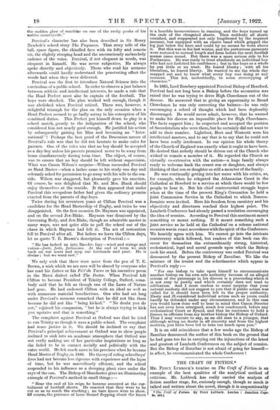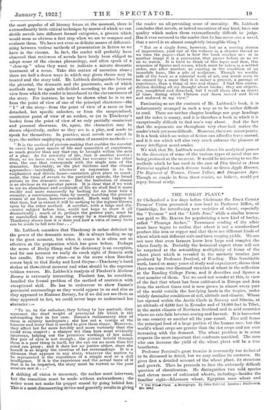THE CRAFT OF FICTION.*
Mn. PERM LIIBBOCR'S treatise on The Craft of Fiction is an example of the hest qualities of the analytical method of criticism. Mr. Lubbock has really carried the analysis of fiction another stage, for, curiously enough, though so much is talked and written about the novel, though it is unquestionably
• The Craft of Fiction. By Percy Lubbock, London : Jonathan Coo. 9e. oda the most -popular of all literary forms. at the -moment, there is extraordinarily little critical technique by means of which we can divide novels into different formal categories, a process which would seem so obvious a first step when we are to compare and evaluate them. We have not even as definite means of differenti- ating between various methods of presentation in fiction as we have in the cinema. In fact, the reader will probably have observed that reviewers of novels have, lately been obliged to adopt some of the cinema phraseology, and often speak of a " close-up " when they want to indicate a minute dramatic treatment of a scene. Take this matter of narration alone ; there are half a dozen ways in which any given theme may be treated and tho story told. Mr. Lubbock distinguishes between the pictorial, the dramatic and the panoramic, each of which methods may be again sub-divided according to the point of view from which the reader is introduced to the circumstances of the story. For instance, he may be shown what he is to see from the point of view of one of the principal characters—the " I " of the story—from the point of view of a more or less detached, but specific onlooker, or from the unspecialized, omniscient point of view of an author, or (as in Thackeray's books) from the point of view of an only partially omniscient and personal showman. Or, again, the characters may be shown objectively, rather as they are in a play, and made to speak for themselves. In practice, most novels are mixed in type, the author employing a succession of narrative methods :-
" It is the method of picture-making that enables the novelist to cover his great spaces of life, and quantities of experience, so much greater than any that can be brought within the acts of a play. As for intensity of life, that. is another matter ; there, as we have seen, the novelist has recourse to his other arm, the one that corresponds with the single arm of the dramatist. Inevitably, as the plot thickens and. the climax approaches—inevitably, wherever an impression is to be emphasized and driven. home—narration gives place to enact- ment, the train of events to the particular episode, the broad picture . to the dramatic scene. But the limitation of drama is as obvious as its peculiar power. It is clear that if we wish to see an abundance and multitude of life we shall find it more readily and more summarily by looking for an hour into a memory, a consciousness, than by merely watching the present events of an hour, however. crowded. Much may happen in that time, but in extent it will be nothing to the regions thrown open by the other method. A novelist, with a large and dis- cursive subject before him, could not hope to show it all dramatically ; much of it, perhaps the greater part, must be so marshalled that it may be swept. by a travelling glance. Thackeray shows how it is done and how a vista of .many facts can be made to fall into lino ..."
Mr. Lubbock considers that Thackeray is rather deficient in the power of the dramatic scene. He is always leading us- up
to the great moment, but when it comes it is often not so effective as the preparation which has gone before. Perhaps the scene of Becky Sharp and the dictionary is an exception, and for one moment we really do catch sight of Beatrix with her candle. But very often—as in the scene when Bowdon
comes btick to find Becky and Lord Steyne—Thackeray's hand shakes at the critical -moment and what should be the supreme tableau wavers. Mr. Lubbock's analysis of Flaubert's Madame Bovary is extremely interesting. Flaubert has, ho considers, handled the formal problem of the method of narration with
exceptional skill. He has to endeavour to show Emma's provincial surroundings as they would appear to us and also as they appeared to Madame Bovary, for if we did not see them as they appeared to her, we could. never hope to understand her character :-
" To us, to the onlooker, they belong to her portrait, they represent tho dead weight of provincial life which is the eutstanding fact in her case Emma's rudimentary idea of them is entirely inadequate ; she has- not a vestige of the humour and irony that is needed to give them shape. Moreover, they affect her far more forcibly and more variously than she could even_ suspect ; a sharper wit than hers must evidently intervene, helping out the primitive workings of her mind. Her pair of eyes is not enough ; the picture beheld through them is a poor thing in itself, for she can see no more than her mind can grasp ; and it does her no justice either, since she herself is so largely the creation of her surroundings. It is a dilemma that appears in any story, wherever the matter to he represented is the experience of a simple soul or a dull intelligence. If it is the experience and the actual taste of it that is to be imparted, the story must be viewed as the poor creature saw it . .."
A shifting of vision is necessary, the author must intervene, but the transition must be made without awkwardness ; the writer must not make. his puppet unreal by going behind her.
This is a most disconserting-device and generally results in giving the reader an all-pervading sense of unreality. Mr. Lubbock concludes that novels, or indeed narratives of any kind, have one quality which makes them extraordinarily difficult to judge.
Has it ever occurred to the reader that be has never .een a novel, that a novel is an almost completely intangible thing ?
" Not as- a single form, however, but as a moving stream of impressions, paid out of the volume in. a slender thread as we turn the pages—that is how the book reaches us : or in another image it is a procession that passes before us as we sit to watch. It is hard to think of this lapse and flow, this sequence of figures and scenes, which must be taken in a settled order, one after another, as existing in the condition of an immobile form, like a pile of sculpture. Though we readily talk of the book as a material work of art, our words seem to bo crossed by a sense that it is rather a process, a passage of experience, than a thing of size and shape. I find this contra, diction dividing all my thought about books ; they are objects, yes, completed and detached, but I recall them also as tracts of time, during which. Clarissa and Anna moved and lived and endured in my view."
Fascinating as are the contents of Mr. Lubboeks book, it is unfortunately arranged in such a way as to be rather difficult to read. There are neither chapter headings nor page headings and the index is scanty, and it is therefore a book in which it is exceptionally difficult to find -one's way about. And the fact that the arguments aro throughout very close-knit makes the
reader's task yet more difficult. However, these arc minor points. It is a book which no writer of fiction can afford to leave unread;
and it is one which will also very much enhance the pleasure of every intelligent novel-reader.
We wish that Mr. Lubbock would direct his analytical powers to the dissection of some of the various types of novel that are
being produced at the moment. It would be interesting to seethe methods which he has used in the case of Pere Goriot or Anna Karenina applied to such diverse books as Green Apple Harvest, The Regiment of Women, Crome Yellow, tftid Dangerous Ages. Though so simple in form these stories, we believe, would yet repay formal study.











































 Previous page
Previous page